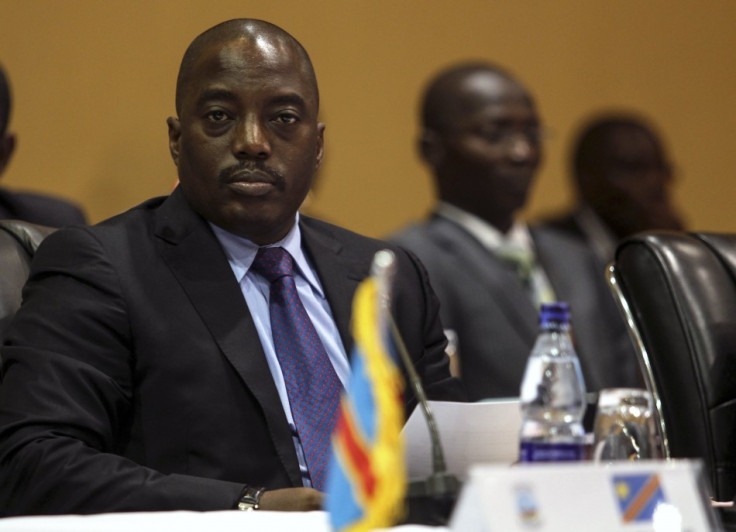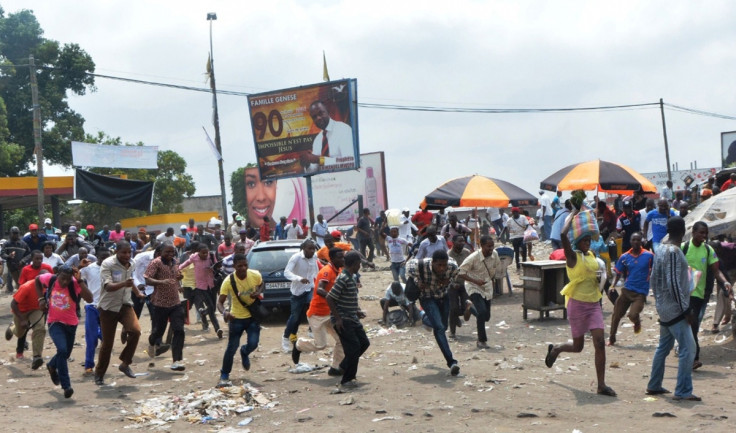DRC: Dozens killed in fresh violence as President Kabila calls for dialogue

Between 12 and 30 people have been killed in fresh attacks in the Democratic Republic of Congo (DRC) during clashes that pitted the army and UN troops against militants. The fighting erupted in the restive north-eastern region of the country marred by widespread violence and human rights abuses against civilians.
The latest episode of violence occurred on 30 November and was blamed on Ugandan rebels in the area. Reuters said the death toll, including at least one UN peacekeeper, was of 30 people. AFP reported at least 12 deaths.
One witness told AFP: "I saw four civilians killed by bullets... and seven patients and a nurse cut up by machete at the hospital."
Millions of people have been killed during conflicts in DRC since 1996 with the eruption of the First Congo war, which ended in 1998, and the Second Congo war – also known as the Great War of Africa – which broke out in 1998 and officially terminated in 2003.
However, hostilities and frequent attacks on civilians, especially in the north-east, have continued since and there are at least 50 different armed groups currently operating along DRC's eastern and western borders.
Kabila's calls for dialogue
The latest killing occurred as President Joseph Kabila called for dialogue with the opposition one year ahead of a presidential election. Next year's election could represent the first democratic transition of power after decades of civil war, political instability and deadly coups in DRC.
Kabila is bound by the constitution to step down as he has served two consecutive terms since 2001. However, he has been accused of trying to postpone the election and amend term limits. Kabila has not made a public statement on his future political career, but his spokesperson has always maintained the president respects the constitution.
The leader also said the election should be postponed arguing that the country was not ready and more time was needed to revise voter rolls and raise funds. Kabila made the comment as elections for councillors and provincial deputies scheduled for October were cancelled after the constituional court ruled that budgetary and logistical restrictions made the deadline untainable.
Kabila said during a speech on state TV on 28 November: "I have decided this day to organise an inclusive national political dialogue and to put in place a preparatory committee to manage all aspects of its organisation."
The president also added that a" responsible consensus" is necessary before the electoral process starts. He added he agreed to have an international mediator during election, one of the key requests brought by the largest opposition party the Union for Democracy and Social Progress (UDPS).
Some members of the opposition believe that the governement's call for an inclusive dialogue is part of Kabila's attempt to hang on to power and have vowed not to participate in the dialogue.
In January, hundreds of people took to the streets to protest against the government's attempt introduce an electoral law reform that required a national census to be carried out before the election.
The bill was seen by critics as a way to delay polls. After clashes resulted in the death of at least 40 protesters, Congo's parliament voted in favour of the bill but agreed to remove the provision that made the election contingent on the census.

Government crackdowns on dissidents
The Comgolese government has been accused of trying to silence activists and opponents to Kabila's attempt to run for a third term.
Amnesty International released a report warning that activists and protesters are arrested and are often denied access to their lawyer and family members. "Individuals in DRC have been arrested, prosecuted and convicted for exercising their human rights," Evie Francq, Amnesty's human rights researcher on DRC and author of the report, told IBTimes UK.
In March, the DRC government stirred international criticism after it arrested pro-democracy activists and US diplomat Kevin Sturr – who was later released – arguing that they were posing a threat to the country. The arrest occurred after a conference in the capital Kinshasa that promoted the participation of youths in politics.
On 28 November, Congolese police fired teargas against activists who had gathered in the city of Goma to mourn civilians who have been killed in recent violence. At least two people were wounded and 14 arrested, Reuters reported. The police has not commented on the incident.
Activists argued that more than 500 people had been killed in attacks – usually carried out overnight – in the surrounding area since October 2014. The ogvernment blamed the violence on Ugandan rebels, while other analysts believe other groups and cirminal gangs are likely to be involved.
Battle for control of the DRC
Check out our Flipboard magazine - Who's who in the battle for DRC by IBTimes UK
In this series on the Democratic Republic of the Congo, IBTimes UK takes a closer look at the eastern regions of South and North Kivu where civilians are still at the mercy of armed groups and the Congolese armed forces, who have all been accused of committing serious war crimes.
© Copyright IBTimes 2025. All rights reserved.






















